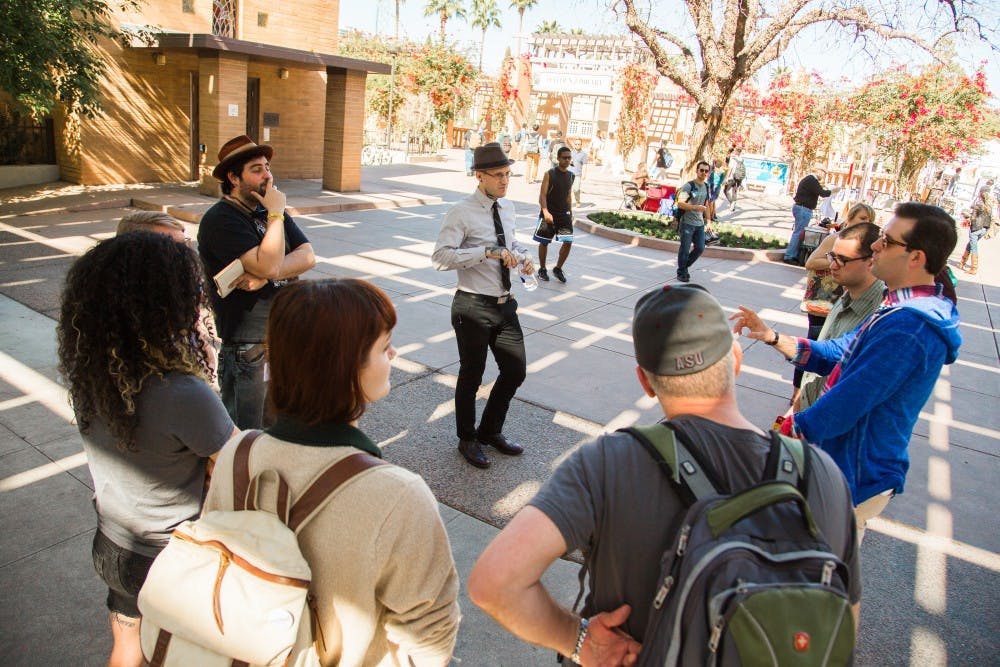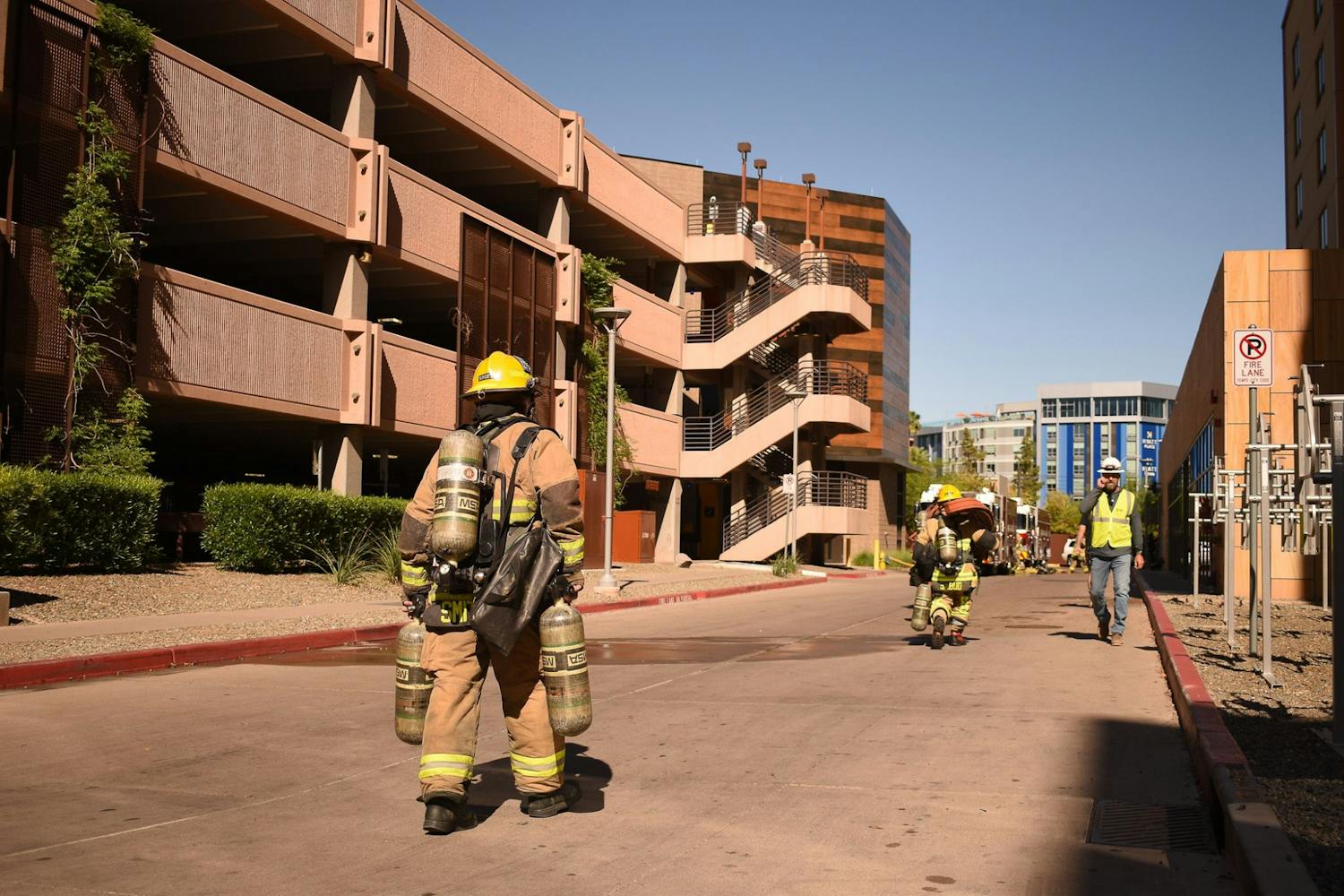 Justice studies graduate student and ASU associate professor Robert Poe listens to students at “The Problem with Whiteness 101,” which was a public teach-in at the Memorial Union on Tuesday. Poe addressed a variety of issues with students regarding the controversy around the course. (Daniel Kwon/The State Press)
Justice studies graduate student and ASU associate professor Robert Poe listens to students at “The Problem with Whiteness 101,” which was a public teach-in at the Memorial Union on Tuesday. Poe addressed a variety of issues with students regarding the controversy around the course. (Daniel Kwon/The State Press)In the midst of ASU’s “Problem of Whiteness” controversy, Cady Mall became a platform Tuesday for a public teach-in that taught passers-by what the “white problem” entails.
Robert Poe, a justice studies doctoral student and faculty associate who said he wanted to respond to criticism of Lee Bebout’s course “U.S. Race Theory & the Problem of Whiteness" led the teach-in, formally called "The Problem of Whiteness 101."
“Part of this is just to have a conversation,” Poe said. “I don’t have any long-term goals, but to have a conversation and to give voice in opposition to (those who disapprove of) the course.”
Posters criticizing the course and the professor as “anti-white” have been posted across campus in recent weeks by the National Youth Front, a white nationalist group. The group’s actions have encouraged threats against the professor, Poe said.
“He’s received both email and phone threats,” he said. “There have also been people directed through his Facebook page. … He’s had to deal with that, but I definitely don’t think he was ready to.”
The professor has received hate mail since the course’s first criticism by broadcast journalism junior Lauren Clark on Fox Network’s “Fox and Friends.” Poe said the segment and the reactionary group’s involvement has incited rage across campus.
“A regular white person (may see) this class being taught and maybe sees the Fox News piece on it (and agree),” he said. “They then start to vocalize their concerns about the course in exactly the same way the National Youth Front does.”
Poe said these reactions stem from a white fear of becoming a minority.
 Justice studies graduate student and ASU associate professor Robert Poe listens to students at “The Problem with Whiteness 101,” which was a public teach-in at the Memorial Union on Tuesday. Poe addressed a variety of issues with students regarding the controversy around the course. (Daniel Kwon/The State Press)
Justice studies graduate student and ASU associate professor Robert Poe listens to students at “The Problem with Whiteness 101,” which was a public teach-in at the Memorial Union on Tuesday. Poe addressed a variety of issues with students regarding the controversy around the course. (Daniel Kwon/The State Press)“They feel attacked by things like affirmative action, or by any sort of programs that privilege people of color, because it’s ‘not equal’ and ‘we’re supposed to be equal now,” he said. “But they just don’t understand that, prior to the 1960s, America was only for white civil rights.”
Poe said he identifies whiteness as a political construct.
“There isn’t anything essential about whiteness,” he said. “It’s about someone taking a specific identity and wrapping a bunch of political power around it.”
The idea of whiteness as a political construct was part of the discussion Poe began in Cady Mall, though some students disagreed with the lecture. Political science senior Nathan Brown said the forum was racist itself.
“I think it’s important to talk about race and racial issues, but I think that grouping any racial category is counterproductive,” he said. “To me, it’s racism.”
African and American studies undergraduate Nicole King said she found the lecture refreshing.
“It’s like somebody gets it,” she said. “Someone other than someone who looks like me, an African American, gets it and is willing to say something. … I don’t understand the issue with (problem of whiteness), because if we can have classes that focus on gender and focus on ethnicity, why is this an issue?”
Lee Bebout, the professor of the “Problem of Whiteness” course, observed the teach-in without sharing his identity and said the lecture was a valid introduction to his course.
“This is often the kind of conversation that we’ll hear in classrooms, but the difference between a teach-in and a classroom is that, in a teach-in, an individual is trying to advance a very specific point of view,” he said. “In a classroom, it’s not really my objective to profess one idea, but rather to set up the scholarly feel so that people can make up their own minds.”
Bebout also said a teach-in is not a complete representation of his course.
“I think that Rob definitely covered one or two things that I would talk about in my class,” he said. “But there are also a lot of thing that I talk about that he didn’t address, and that’s the difference between a one-hour teach-in and a 15-week conversation.”
Reach the reporter at aplante@asu.edu or follow @aimeenplante on Twitter.
Like The State Press on Facebook and follow @statepress on Twitter.




